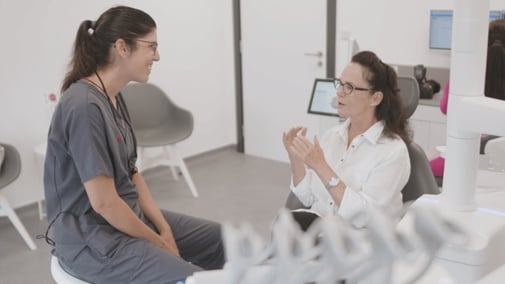
First impressions matter.
When a patient comes to see us for the first time, they're not really interested in their teeth; they might think that they are, or they might say that they are, but what they're interested in is interviewing you for a job.
It's a question of trust.
When you get to the other side of this, like when I had to take Callum, my son, when he was eight years old, to a dentist in Italy whom I had never met after he had shattered his upper central incisor on the bottom of the swimming pool, I wanted to be able to trust the person who looked after him.
It was not something I could fix. I'm not allowed composite in my practice because I'm so bad with it, and so I wanted to go somewhere to get help but to be given the chance to interview them first and to be able to walk out if I was unsafe or unsure about where we were going.
First impressions really mattered that day, and the practice in northern Italy smashed it out of the park, an experience I will never forget.
This is a teachable skill. You can learn how to meet people in a better way, and the advantages for everyone involved are huge.
Maybe this is something that's taught at dental schools now expansively and in great detail, but I see no evidence of that.
The Consultation Masterclass that we provide at The Campbell Academy is a one-day exploration into how to meet patients for the first time when they present to see you for dental issues or problems or to ask your advice, but more to try to see if they're able to trust you and put their fears and their concerns and their hopes and their dreams in your hands.
It's impossible to build a relationship like that with someone in the space of 5 to 7 minutes, and also impossible to do it on a Zoom call before the patient attends.
We have developed a format for this in a very teachable way, which structures the consultation into four sections and then instructs individuals what to do in each of those sections with a recipe that helps to build a bridge of trust.
We allow flexibility in this for you to take it back to your own environment, but this is a tried and tested method over decades, which generally yields about 80% success in being able to introduce and invite patients to attend for further treatment.
It also does something, though, that very few people understand; it opens the door for you to explain to patients the answers to the questions that they have not asked.
Once you have built the bridge to trust, it is possible for you to explore other concerns, issues, and difficulties that patients have in order for you to provide an even better result.
It also expands on the potential personalities of individual patients and how they need to be addressed and dealt with in a sensitive environment in very different ways.
This is one of the greatest bits of work I have ever done in developing this, and I am so proud of what we have achieved.
It has gained international attention, and I have been asked to present it in different countries and other places, write about it, and talk about it in different ways.
The next edition of this course face-to-face at The Campbell Academy, where it all started, is here.
If you'd like a place or even to talk to us about whether it might fit your character and your situation, just click here, and we can chat.
Blog Post Number - 3695





Leave a comment